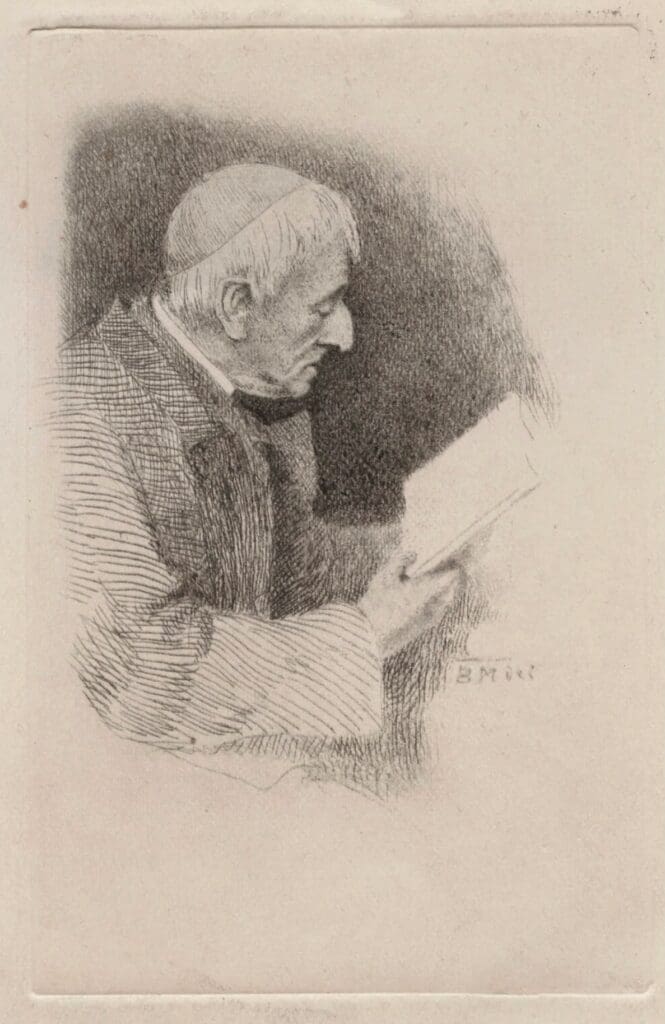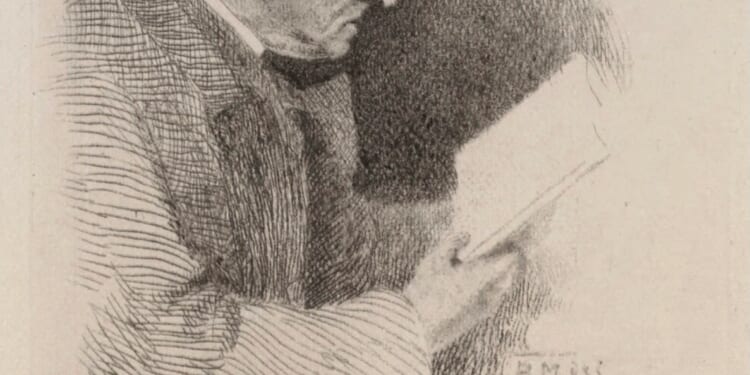For devotees of Cardinal Newman, the coming week was already highly anticipated, with his formal declaration as a Doctor of the Church on the solemn feast of All Saints. Then this week, the Vatican announced that Pope Leo XIV would also name him the co-patron saint of Catholic education, along with St. Thomas Aquinas.
A happy thing, as few have given as much thought to the philosophy of education as St. John Henry, particularly regarding his (ill-fated) project in Dublin to found a Catholic university. Though the combination of Aquinas and Newman – or the combination of Aquinas and anyone? – is formidable, I confess I never think of them as teachers, per se.
Scholars, certainly. And seekers of truth, more students themselves even than teachers of others. Both were creatures of the university – and professors do research and teach, with many accepting the latter as the price of doing the former. It’s not unusual for the most accomplished scholars to teach very little, if at all. In the event, both patrons taught more through their writing rather than their lectures or tutorials.
The Aquinas-Newman dyad is a happy one for another reason, in that over many years on campus their prayers were the ones I most recommended to students, fitting for their stage of life. Both wrote prayers and hymns. St. Thomas gave us the hymns for Corpus Christi, and I consider no occasion unsuitable for Praise to the Holiest in the Height (here), Newman’s hymn from The Dream of Gerontius.
The prayers I recommended to students were Aquinas’ Prayer before Study and Newman’s Mission of My Life. Not only young students can profit by praying them.
The Thomistic prayer before study appears here and there in different forms. The estimable Dominican friars of the St. Joseph Province use this version:
Creator of all things, true source of light and wisdom, origin of all being, graciously let a ray of your light penetrate the darkness of my understanding.
Take from me the double darkness in which I have been born, an obscurity of sin and ignorance. Give me a keen understanding, a retentive memory, and the ability to grasp things correctly and fundamentally.
Grant me the talent of being exact in my explanations and the ability to express myself with thoroughness and charm.
Point out the beginning, direct the progress, and help in the completion. I ask this through Jesus Christ our Lord. Amen.
The version I first learned when I was an undergraduate appears in the Raccolta, and expands the initial salutation:
Infinite Creator, who in the riches of Thy wisdom didst appoint three hierarchies of Angels and didst set them in wondrous order over the highest heavens, and who didst apportion the elements of the world most wisely…
It reminds us why Thomas is the Angelic Doctor, and a reminder too that intelligences have a lofty place in God’s providence. I could never remember what the three hierarchies of angels were, but no matter, it was pleasing to think that they were watching over me.

The Raccolta’s English translation speaks of “copious eloquence,” but the Dominican version above goes with “thoroughness and charm.” I prefer the latter, as the world needs more wholesome and holy charm. Students, it seems to me, would learn better from charming teachers, even though neither Aquinas nor Newman are often thought of as charming. Newman, though, does propose in his “definition of a gentleman” a kind of charm as desirable.
Education depends upon good teachers, but the goal of education is to effect some good in the students. Thus, Aquinas and Newman are exemplary models, for their achievements in the life of the mind, the search for truth, effected in them genuine goodness, the witness of holiness.
The Prayer before Study was never as popular as Newman’s Mission of My Life, which many memorized. Study, after all, can be hard. A mission is exciting.
Newman’s prayer is simply one of the best ever written in English and, while resonant with the young whose future is open before them, could be prayed with great comfort and sincerity even around a deathbed.
God has created me to do Him some definite service.
He has committed some work to me which He has not committed to another. I have my mission.
I may never know it in this life, but I shall be told it in the next. I am a link in a chain, a bond of connection between persons. He has not created me for naught.
I shall do good; I shall do His work. I shall be an angel of peace, a preacher of truth in my own place, while not intending it if I do but keep His commandments.
Therefore, I will trust Him, whatever I am, I can never be thrown away. If I am in sickness, my sickness may serve Him, in perplexity, my perplexity may serve Him. If I am in sorrow, my sorrow may serve Him. He does nothing in vain.
He knows what He is about. He may take away my friends. He may throw me among strangers. He may make me feel desolate, make my spirits sink, hide my future from me. Still, He knows what He is about.
There is a touch of divine humor in the patron of Catholic education writing of “perplexity” serving God, but Newman knew that it could. And “perplexity” is simply a delightful word, used too rarely in prayer and ordinary speech, which is strange given that the perplexed are superabundant. Certainly, students experience perplexity, and it is reassuring to know that it, too, can serve God.
The prayers of Catholic education’s patrons underscore that education includes, but is not exhausted by, knowledge. It is about an encounter which can become a relationship; St. John Paul the Great noted in Fides et Ratio that the ancient philosophers considered friendship the most “appropriate context” for education. The teacher shares with the student something he has, but does not lose, when the student acquires it. That is a kindness, a sharing of a now common good, an act of friendship – even if the teacher is a bit grumpy. Better to be charming.
The ultimate friendship which Catholic education offers is friendship with God. To study, to search for truth, to discover a mission – all this is to experience the astonishing reality that God wishes to share what He alone possesses in all fullness. Both Aquinas and Newman knew that, lived that, and proposed that to others.
There are prayers before and after meals. Why not prayers before and after class? At the beginning, asking for the “ray of [divine] light” to illumine the teacher and students alike. And after, should, despite the teacher’s best efforts, perplexity prevail, to know that it serves Him too.











